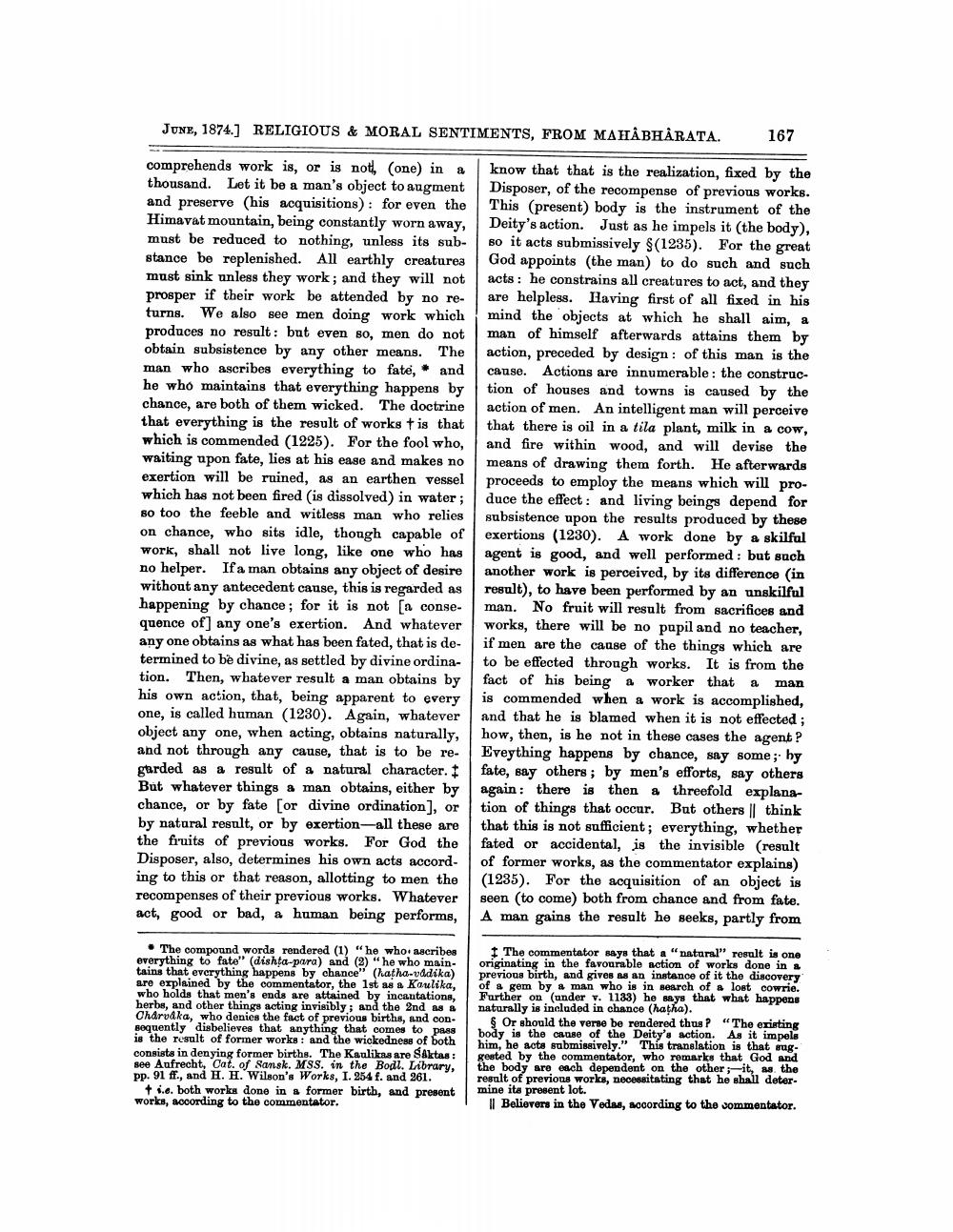________________
JUNE, 1874.] RELIGIOUS & MORAL SENTIMENTS, FROM MAHABHARATA.
comprehends work is, or is not, (one) in a thousand. Let it be a man's object to augment and preserve (his acquisitions): for even the Himavat mountain, being constantly worn away, must be reduced to nothing, unless its substance be replenished. All earthly creatures must sink unless they work; and they will not prosper if their work be attended by no returns. We also see men doing work which produces no result: but even so, men do not obtain subsistence by any other means. The man who ascribes everything to fate, and he who maintains that everything happens by chance, are both of them wicked. The doctrine that everything is the result of works + is that which is commended (1225). For the fool who, waiting upon fate, lies at his ease and makes no exertion will be ruined, as an earthen vessel which has not been fired (is dissolved) in water; so too the feeble and witless man who relies on chance, who sits idle, though capable of work, shall not live long, like one who has no helper. If a man obtains any object of desire without any antecedent cause, this is regarded as happening by chance; for it is not [a consequence of] any one's exertion. And whatever any one obtains as what has been fated, that is determined to be divine, as settled by divine ordination. Then, whatever result a man obtains by his own action, that, being apparent to every one, is called human (1230). Again, whatever object any one, when acting, obtains naturally, and not through any cause, that is to be regarded as a result of a natural character. ‡ But whatever things a man obtains, either by chance, or by fate [or divine ordination], or by natural result, or by exertion-all these are the fruits of previous works. For God the Disposer, also, determines his own acts according to this or that reason, allotting to men the recompenses of their previous works. Whatever act, good or bad, a human being performs,
The compound words rendered (1) "he who ascribes everything to fate" (dishta-para) and (2) "he who maintains that everything happens by chance" (hatha-vadika) are explained by the commentator, the 1st as a Kaulika, who holds that men's ends are attained by incantations, herbs, and other things acting invisibly; and the 2nd as a Charvaka, who denies the fact of previous births, and consequently disbelieves that anything that comes to pass is the result of former works: and the wickedness of both consists in denying former births. The Kaulikas are Saktas: see Aufrecht, Cat. of Sansk. MSS. in the Bodl. Library, pp. 91 ff., and H. H. Wilson's Works, I. 254 f. and 261.
ti.e. both works done in a former birth, and present works, according to the commentator.
167
cause.
know that that is the realization, fixed by the Disposer, of the recompense of previous works. This (present) body is the instrument of the Deity's action. Just as he impels it (the body), so it acts submissively §(1235). For the great God appoints (the man) to do such and such acts: he constrains all creatures to act, and they are helpless. Having first of all fixed in his mind the objects at which he shall aim, a man of himself afterwards attains them by action, preceded by design: of this man is the Actions are innumerable: the construction of houses and towns is caused by the action of men. An intelligent man will perceive that there is oil in a tila plant, milk in a cow, and fire within wood, and will devise the means of drawing them forth. He afterwards proceeds to employ the means which will produce the effect: and living beings depend for subsistence upon the results produced by these exertions (1230). A work done by a skilful agent is good, and well performed: but such another work is perceived, by its difference (in result), to have been performed by an unskilful man. No fruit will result from sacrifices and works, there will be no pupil and no teacher, if men are the cause of the things which are to be effected through works. It is from the fact of his being a worker that a man is commended when a work is accomplished, and that he is blamed when it is not effected; how, then, is he not in these cases the agent? Eveything happens by chance, say some; by fate, say others; by men's efforts, say others again: there is then a threefold explanation of things that occur. But others || think that this is not sufficient; everything, whether fated or accidental, is the invisible (result of former works, as the commentator explains) (1235). For the acquisition of an object is seen (to come) both from chance and from fate. A man gains the result he seeks, partly from
The commentator says that a "natural" result is one originating in the favourable action of works done in a previous birth, and gives as an instance of it the discovery of a gem by a man who is in search of a lost cowrie. Further on (under v. 1133) he says that what happens naturally is included in chance (hatha).
§ Or should the verse be rendered thus ? "The existing body is the cause of the Deity's action. As it impels him, he acts submissively." This translation is that suggested by the commentator, who remarks that God and the body are each dependent on the other;-it, as the result of previous works, necessitating that he shall determine its present lot.
I Believers in the Vedas, according to the commentator.




